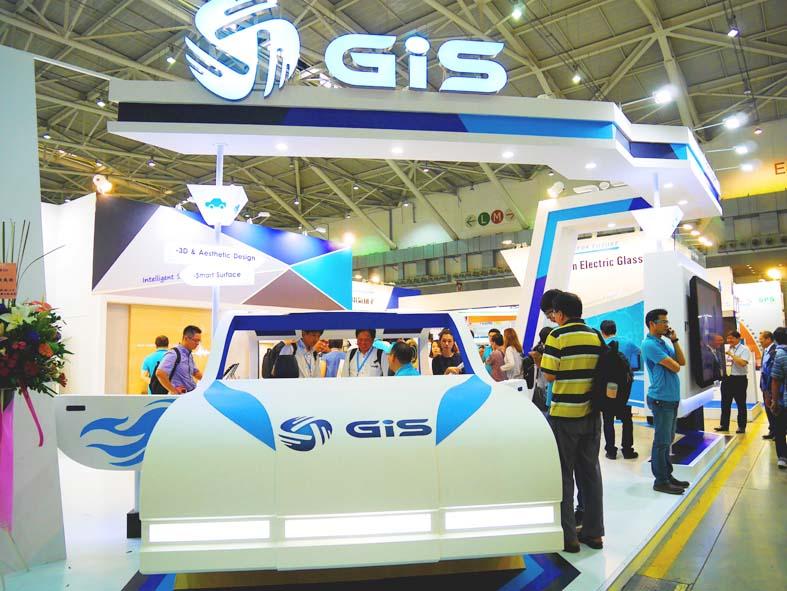GIS Holding Ltd (業成), which supplies touch modules for Apple Inc’s iPads and MacBooks, yesterday said its net profit last year grew 10 percent annually, benefiting from increased demand for notebook computers and tablets as the stay-at-home trend persisted due to the COVID-19 pandemic.
Net profit rose to NT$3.73 billion (US$131.79 million), compared with NT$3.39 billion in 2019, the company said in a filing with the Taiwan Stock Exchange.
It was the fourth consecutive year that the company’s annual profit surpassed its share capital of NT$3.39 billion.

Photo: Chen Mei-ying, Taipei Times
Earnings per share rose to NT$11.04 last year from NT$10.02 the prior year. Gross margin dropped to 8.62 percent last year from 8.86 percent in 2019, the company said.
GIS is 24 percent owned by iPhone assembler Hon Hai Precision Industry Co (鴻海精密).
The Miaoli-based company has aimed to increase shipments of higher-definition touch modules equipped with mini-LED backlights for tablets and OLED touch modules for smartphones.
Revenue grew 6.16 percent to NT$127.1 billion last year from NT$119.72 billion in 2019.
Yuanta Securities Investment Consulting Co (元大投顧) said GIS has benefited from pandemic-driven demand for notebook computers and tablets with touch modules, with a revenue contribution of 75 to 80 percent.
GIS received extra orders from Apple, but lower orders from Chinese touch module supplier O-film Tech Co (歐菲光) due to trade frictions between the US and China, the investment consultant said in a report.
GIS in a separate filing said its board of directors has approved a plan to distribute a cash dividend of NT$4 per common share, representing a dividend yield of 3.4 percent based on the stock’s closing price of NT$114.5 yesterday.
The plan is subject to shareholder approval at an annual general meeting set for May 28.
GIS also plans to invest NT$3.4 billion to expand production capacity at a Chinese touch module factory in Chengdu, Sichuan Province, it said yesterday.
The company’s revenue grew 9.75 percent annually to NT$6.39 billion last month from NT$5.83 billion.
That represented a monthly decline of 21 percent from NT$8.11 billion in January, due to fewer working days.
Revenue in the first two months of this year rose 10.53 percent to NT$14.5 billion, compared with NT$13.12 billion in the same period last year.

Intel Corp chief executive officer Lip-Bu Tan (陳立武) is expected to meet with Taiwanese suppliers next month in conjunction with the opening of the Computex Taipei trade show, supply chain sources said on Monday. The visit, the first for Tan to Taiwan since assuming his new post last month, would be aimed at enhancing Intel’s ties with suppliers in Taiwan as he attempts to help turn around the struggling US chipmaker, the sources said. Tan is to hold a banquet to celebrate Intel’s 40-year presence in Taiwan before Computex opens on May 20 and invite dozens of Taiwanese suppliers to exchange views

Application-specific integrated circuit designer Faraday Technology Corp (智原) yesterday said that although revenue this quarter would decline 30 percent from last quarter, it retained its full-year forecast of revenue growth of 100 percent. The company attributed the quarterly drop to a slowdown in customers’ production of chips using Faraday’s advanced packaging technology. The company is still confident about its revenue growth this year, given its strong “design-win” — or the projects it won to help customers design their chips, Faraday president Steve Wang (王國雍) told an online earnings conference. “The design-win this year is better than we expected. We believe we will win

Quanta Computer Inc (廣達) chairman Barry Lam (林百里) is expected to share his views about the artificial intelligence (AI) industry’s prospects during his speech at the company’s 37th anniversary ceremony, as AI servers have become a new growth engine for the equipment manufacturing service provider. Lam’s speech is much anticipated, as Quanta has risen as one of the world’s major AI server suppliers. The company reported a 30 percent year-on-year growth in consolidated revenue to NT$1.41 trillion (US$43.35 billion) last year, thanks to fast-growing demand for servers, especially those with AI capabilities. The company told investors in November last year that

Power supply and electronic components maker Delta Electronics Inc (台達電) yesterday said it plans to ship its new 1 megawatt charging systems for electric trucks and buses in the first half of next year at the earliest. The new charging piles, which deliver up to 1 megawatt of charging power, are designed for heavy-duty electric vehicles, and support a maximum current of 1,500 amperes and output of 1,250 volts, Delta said in a news release. “If everything goes smoothly, we could begin shipping those new charging systems as early as in the first half of next year,” a company official said. The new